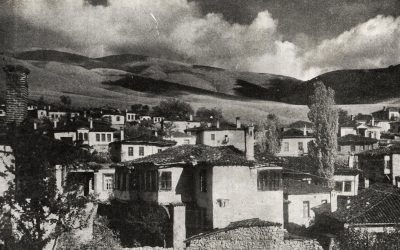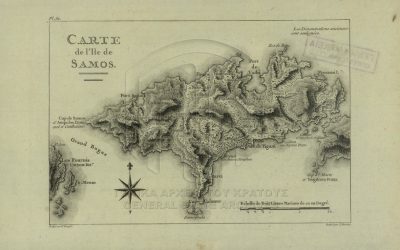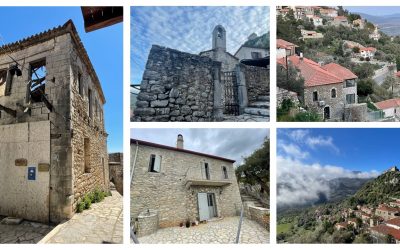By George P. Zimmar
for all have sinned and fall short of the glory of God
Romans, 3,23
Shortly after WWII ended, Greek immigration to the United States reopened, especially to those without communist sympathies. After Winston Churchill’s March 5, 1946 Iron Curtain speech at Westminster College, U.S. attitudes toward the Soviet Union hardened and the ally against fascism became an enemy against freedom. My dad’s cousin Christos Tseronis was an early arrival (circa 1946), and for brief periods he stayed at our home as he applied for investiture of his credentials in medicine. A tall, handsome man in his mid-30s with an aquiline nose and pencil mustache, he cut a dashing figure. Yet a shroud of doom encircled his persona.
Christos was a physician and during the war of occupation against the Nazis a resistance (antartis) leader in Peloponnesus operating out of his and my dad’s home village, Kosmas in Peloponnesus. Like many intellectuals of the day, Christos’s politics were left of center. My dad’s family expressed points of view that stood in sharp divergence to my mom’s family, which had a traditional and conservative outlook on politics and life. In a sense these opposing views may account for the split personality that I at times feel myself, while embracing contradictory ideas.
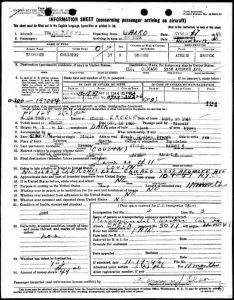
Christos’s troop roamed Lakonia and Arcadia unimpeded. While posters for information leading to his capture were posted throughout the region, he would enter Sparta without his band of brothers, obtain medical supplies from a fellow physician, Dr. Anargyros Kanellis (a relative of my mother), and have lunch with him and his Austrian wife, Gizela,[i] without fear of capture. Gizela cautioned Christos not to kill Germans; the retaliation on the populace would be brutal.
Early in the resistance a company of Italian troops was sent to the redoubt Christos had in Kosmas to burn the village. Previously, while in Geraki, my mother’s village, the Italian captain had brought all the villagers to the plateia (town square) and harangued them about their silence on Christos’s whereabouts. Yet none came forward. In disgust, the captain sputtered in Greek, “Tha pao Kosmas, kapso Kosmas; tha pao Geraki, kapso Geraki (I will go to Kosmas and burn it to the ground; I will return to Geraki and burn it to the ground).”
The mountain roads to Kosmas were little more than sharp, rocky footpaths, wide enough perhaps for a donkey cart. A traveler would proceed up the steep grade to a point and swing upward in the opposite direction to the next high point, much as a sailboat tacking in the water. The Italian company proceeded in single file when suddenly gunfire from across the valley struck the men one after the other. Captain Tseronis’s troop fired mercilessly on the hapless Italians. Moreover, their retreat was blocked by partisans in hidden positions on the road below. A few Italians made it back to Geraki and were hidden by the villagers from reprisal by both the partisans and the German commandant in charge of the region.
The year Christos arrived in the U.S., Christmas was celebrated at our apartment. Christmas at our home was truly a festive affair. A large pine tree to the ceiling was overly laden with ornaments and stringy silver strands that hid the branches. On Christmas morning, gifts mysteriously appeared under the tree that was bare the night before. One year I stayed up in the front room to wait for Santa Claus. After hearing bells and the clop-clop of a horse from the street below, I looked outside to see the milkman making his rounds in what was no doubt one of the last horse-drawn milk wagons. I fell asleep and when I woke to the gift-laden tree, my faith in Santa remained unbroken.
Do you like this “Yiayia & Me” story? Help us with the next one!
Share your story or consider a donation and make your Yiayia proud!
Dad’s brother, Athanasios (Tom), sister, Styliani (Stella), and families arrived on Christmas day, as did mom’s cousins, Tom and Gus Metos. We filed around the dining room table, and Christos was placed at its head, being the luminary that he was. The conversation centered on the Civil War in Greece (1943–1949), with some taking the Greek government’s side, which was supported by Britain and the United States, and the idealists, the KKE (Communist Party of Greece), supported by communists in Bulgaria. In Yalta, Stalin had accepted that Greece would remain in the West’s sphere of influence and so withdrew the agents that were in Greece during the war. Nonetheless, the communists fought on and were defeated in 1949, with the remnant fleeing to Eastern bloc countries. Being the man of few words that he was, Christos engaged little in the conversation, but somehow his presence dominated the room.
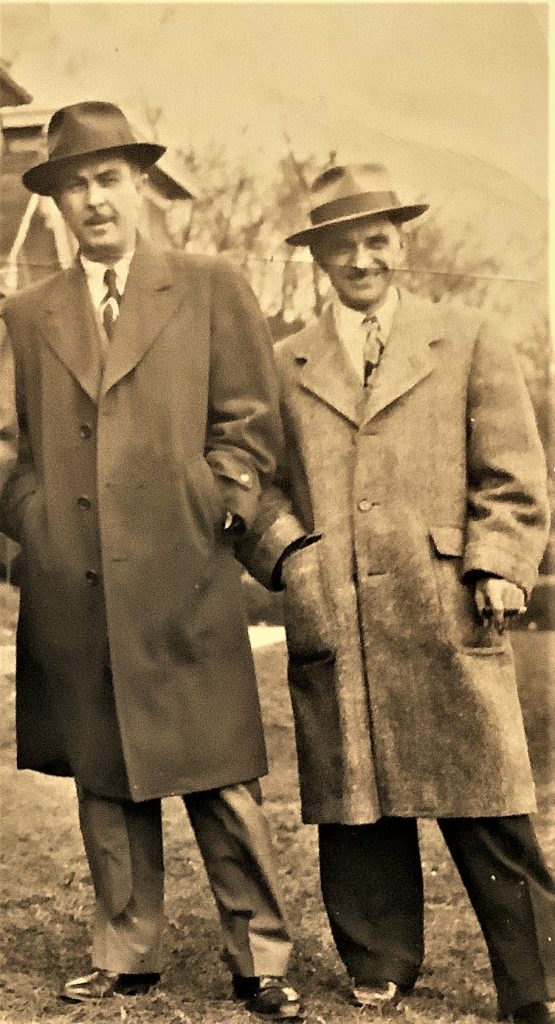
After the guests left, Christos spent a few days at our home until he established his residency at the hospital. Gleefully, I brandished my gift pistol with a suction cup missile in the barrel. Christos motioned for me to give him the toy gun. The bullseye target was tacked onto the mantel over the fireplace. He took the toy, extended his arm, and for what seemed the longest time took aim, then squeezed the trigger. The missile flew across the room and popped onto the very center of the bullseye. He said not a word but handed back the toy with a message in his world-weary eyes: If you aim for something, do not miss the mark; it can be tragic.
Hamartia, the Greek word for sin or error in judgment conveys the idea of missing the mark. “Thus, Hamartia is an error or miscalculation, but the error may arise from any of the three ways: It may arise from ‘ignorance of some fact or circumstance’, or secondly, it may arise from hasty or careless view of the special case, or thirdly, it may be an error voluntary, but not deliberate, as acts committed in anger.”[i] In Aristotle’s Poetics (translated by S.H. Butcher), hamartia conveys all three meanings, and the tragic hero often falls to his doom as a result.
In the Greek tragedy “Oedipus, the King,” based on myth, Oedipus commits all three errors. On the road to Thebes, he angrily encounters and unknowingly kills his father, Laius. After solving the Riddle of the Sphinx, he enters Thebes in glory but was ignorant that Jocasta, the widowed queen he was to marry, was in fact his mother. Later, when Thebes was beset with drought and pestilence, Oedipus received omens that perhaps he was the son of Laius and perhaps Jocasta was his mother. Oedipus’s tragedy was that he both believed and disbelieved his personal situation, failed to act, and set himself up for a tragic end. In the process, he missed the mark.
When Christos contemplated the warning of Gizela about reprisals, he was of two minds. The Germans had not committed atrocities in his region of combat (Arcadia and Lakonia), but carnage had taken place in other regions of Greece, notably Crete. Italy had signed an armistice with the Allies, so the Italian troops in Peloponnesus were no longer a factor in the conflict; however, the Germans moved into their encampments. So, it was entirely possible, even with a price on his head because of wiping out the Italian company, that his region would be spared.
It was not to be. A German commander traveling with his bodyguard to Tripoli in Arcadia was ambushed by an antartes band. Immediately, German command ordered that Lakonia and Arcadia be cleared of antartes. From November 1943 until the Germans retreated from Greece in late 1944, the populace in the area was butchered.[i] The antartes, protected in their mountain strongholds, remained relatively unharmed by the German order to clear the area, but women were raped, the populace murdered, and villages were set in flames. Christos both believed and did not believe that the Germans would slaughter men, women, and children in the villages that were his homeland. He both believed and did not believe that his region would be spared. Gizela had informed him of the certain German response; yet, like Oedipus, Christos clung to the hope that calamity would not strike. Like Oedipus, Christos missed the mark.
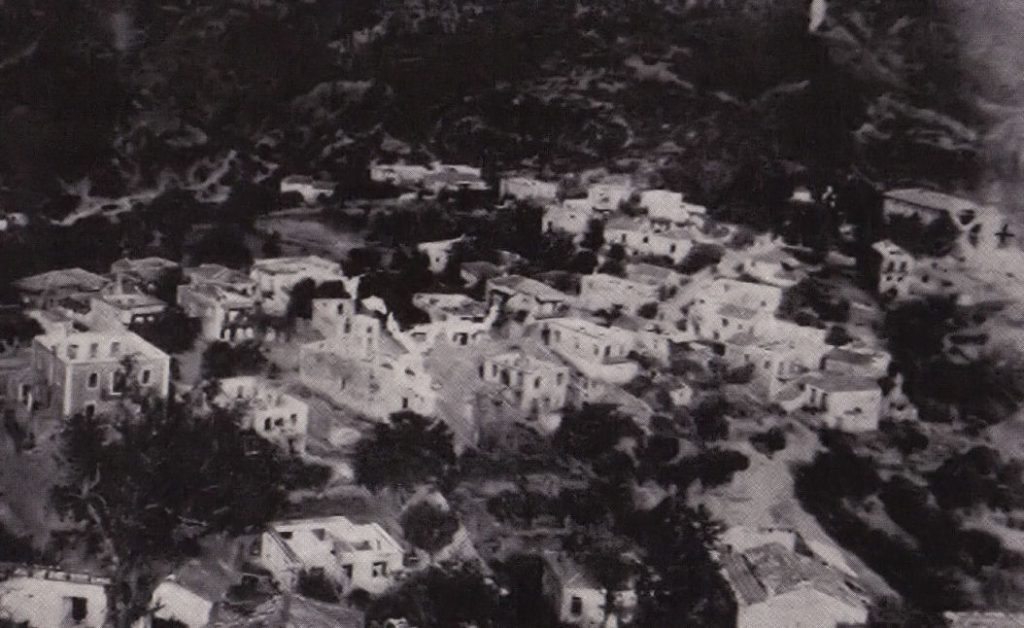
For Aristotle, the tragic hero had to be a noble person of eminence, perhaps so that the fall from grace would be steep and deep. “Hamartia is an error, or a series of errors, ‘whether morally culpable or not,’ committed by an otherwise noble person, and these errors derive him to his doom. The tragic irony lies in the fact that hero may err mistakenly without any evil intention, yet he is doomed no less than immorals who sin consciously. He has Hamartia and as a result his very virtues hurry him to his ruin.” The ironic tragedy of noble Christos is that as a physician, he committed to both saving life and taking life and thereby bore Hamartia. While there is no word in English that denotes the meaning of hamartia, what can we take from the idea that relates to our personal behavior as we aim to negotiate our fast-changing world with noble aspirations?
[i] Gizela Dusek was born in Vienna, Austria, around 1900. In 2017, she became one of the main characters of Stavroula Samailidou-Vakou’s novel “Aroma Rezentas”.
[i] Brief analysis of Aristotle’s concept of ideal tragic hero from Engliterarium.
[i] German atrocities in Arcadia and Lakonia in 1943 and 1944:
November 1943: Germans kill 118 people in the village of Monodendri in Lakonia. Of the 118 executed, 89 were Spartans. There were minor children and a woman among the victims.
December 5, 1943: Germans abduct 50 prisoners from Tripoli camp. They were hanged for “exemplification” at the Andritsos Argos train station.
December 7, 1943: Germans execute 40 hostages in prison in Gytheio, Lakonia.
December 1943: The Germans execute a total of 119 people in the Lakonia Prefecture in the villages of Andritsa, Passava, and elsewhere.
January 1944: The Germans execute 456 hostages from the prisons in Tripoli.
February 24, 1944: The Germans execute 204 people in Megalopolis, Arcadia (from the prisons in Tripoli).
March–Summer 1944: Germans kill 50 people in the village of Monodendri, Lakonia in March; 244 people in Sparta in March–April; 40 people in the area of Agioi Anargyroi (Zoupena) and the Soustianoi region (Lakonia) in June; 77 people in Panitsa, Skamnaki and Gytheio in summer.

